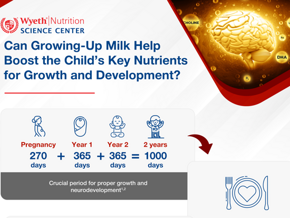
Article
Long-term effects of LCPUFA supplementation on cognitive outcomes
Healthy Eating & Hydration
2 min read
The effect of long-chain polyunsaturated fatty acid (LCPUFA) intake on cognitive development is controversial. Most randomized trials have assessed cognition at 18 mo, although significant development of cognitive abilities (early executive function) emerge later.
- Method:
- Eighty one 18-month old children who participated in LCPUFA supplementation trial as infants were recruited.
- Age-appropriate, specific cognitive tests were conducted every 6 months from 18 months to 6 years old to test for cognitive development.
- Key Findings:
- At 18 months old, LCPUFA supplementation did not influence mental and psychomotor performance on standardized tests*.
- LCPUFA supplemented groups showed significant positive difference from 3 to 5 years old on more specific or fine-grained tasks (such as rule-learning and inhibition tasks and the Peabody Picture Vocabulary Test at 5 y).
- LCPUFA supplementation did not show a significant effect on tasks of spatial memory, simple inhibition nor advanced problem solving.
- Conclusion:
Effect of LCPUFA supplementation may not always be evident at 18 months and studies of nutrition and cognitive development should continue through early childhood.
*An earlier report, demonstrated increased sustained attention in LCPUFA supplemented groups compared to the control group at 9 months of age (Colombo et al., Pediatric Res 2011; 70:406-10).
WYE-EM-163-MAY-14
Reference
Colombo J, Carlson SE, Cheatham CL, Shaddy DJ, Kerling EH, Thodosoff JM, Gustafson KM, Brez C. Long-term effects of LCPUFA supplementation on childhood cognitive outcomes. Am J Clin Nutr. 2013 Aug;98(2):403-12. doi: 10.3945/ajcn.112.040766. Epub 2013 Jun 26. Link to PubMed
If you liked this post you may also like



